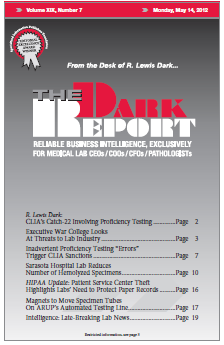CEO SUMMARY: Despite taking appropriate steps to complete proficiency testing (PT), in recent years an unknown number of labs were determined to be in violation of CLIA requirements. Federal regulators are enforcing penalties ranging from suspension of the labs’ licenses to transition to new lab ownership for two years. A lawyer involved in several of …
Inadvertent PT “Errors” Trigger CLIA Sanctions Read More »
To access this post, you must purchase The Dark Report.


